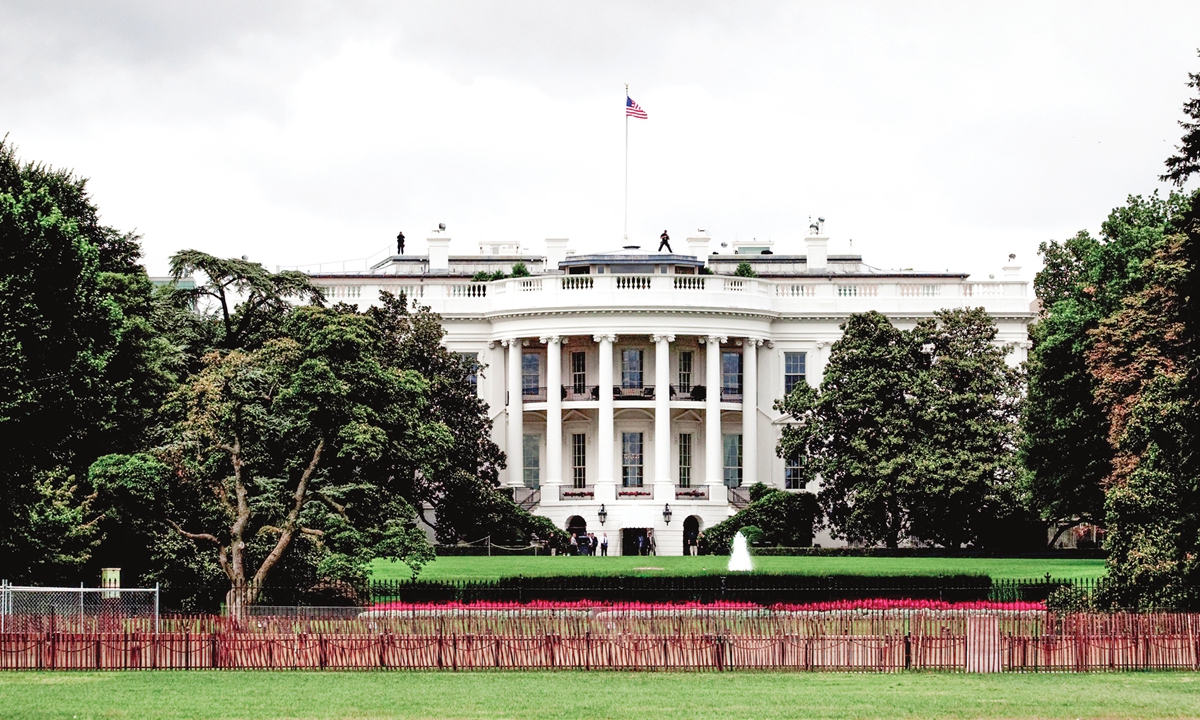'Weighing guns more than butter' becoming a bipartisan trend as Biden unveils $6.8 trillion budget plan with emphasis on China

The White House Photo: VCG
US President Joe Biden proposed a $6.8 trillion budget for the 2024 fiscal year on Thursday, laying out plans that include increasing military spending, promoting social welfare programs, raising taxes on the rich and deficit reduction. The US will invest in new ways to outcompete China globally, as the latter is "the US' only competitor with both the intent to reshape the international order and increasingly, the economic, diplomatic, military, and technological power to do it," read the US budget.
Analysts believed that the budget plan reflected the Biden administration's intention to beef up military deterrence abroad and be more competitive in civilian affairs as the 2024 election approaches.
However, given the polarization and deep-rooted political differences between the two parties, social welfare program and tax increases on the rich in Biden's plan are unlikely to be entirely accepted by the Republican-controlled House, and in the context of great power confrontation, defense spending increases are becoming a rare consensus, which means that "weighing guns more than butter" is increasingly becoming a bipartisan trend.
According to the 182-page proposal, the White House plans to slash the deficit by $3 trillion over the next decade, and raise trillions of dollars in taxes on the wealthy and corporations, including by instituting a 25 percent minimum tax on the top 0.01 percent wealthiest Americans, while boosting investment in child care, education, housing and health care.
GOP House Speaker Kevin McCarthy, who has been demanding significant spending cuts, responded to the plan on Twitter, saying it is "completely unserious."
But for the Pentagon's rising spending, the White House is suggesting $842 billion, a hike of $26 billion or about 3 percent, in order to assist Ukraine and counter China.
The budget requests $753 million for Ukraine and more than $6 billion to support Ukraine and other NATO allies in Europe.
In terms of the "strategic competition" with China, the budget proposed $9.1 billion in investments through the Pentagon's "Pacific Deterrence Initiative," to boost the US and its allies' capacity in the Indo-Pacific region. The budget also includes $400 million in discretionary funding "to counter specific problematic China behaviors globally."
Analysts said that Biden's budget plan could be interpreted as a suggestion by the president, while the main budget decisions remain with the Congress. After the president submitted his final budget request to Congress, the two chambers will work to pass their own Budget Resolution (BR), and then reconcile their differences and approve a congressional BR.
Diao Daming, an associate professor at the Renmin University of China in Beijing, said that given the two parties both control one chamber, the Senate's BR is likely to follow Biden's path, while the House's BR will include more GOP ideas.
"Fiscal power is higher in the House than the Senate, so normally the final plan is likely to be a more Republican-led agenda," Diao said, "it means that on military spending, Republicans will be happy to accept the White House's suggestion or even add more, while on the Democratic agenda, such as health care, welfare and education, taxing the rich, it will be extremely hard for Biden to get his way."
Lü Xiang, a research fellow at the Chinese Academy of Social Sciences, told the Global Times on Friday that the US deficit in 2024 would be even higher if the congress adopted Biden's plan of excessive spending.
After the Trump tax cuts, Biden's tax increases would face stiff resistance from Republicans and businesses, he added.
According to a Bloomberg report, the US deficit in 2024 would increase from $1.6 trillion to $1.8 trillion, and the gross federal debt would swell to $51 trillion after a decade.
By proposing something that seems unacceptable to Republicans, Biden may have left room for negotiations over raising the debt ceiling at a later date, Diao said. The US faces a fierce partisan debate in raising the country's $31.4 trillion debt ceiling. If the White House and Congress fail to agree on a debt-ceiling increase in the coming months, the US could default on its financial obligations for the first time.
With Republicans in control of the House, they are also likely to use the fiscal budget to negotiate with the White House for changes in foreign policy, such as being more aggressive toward China, at the most tense period in bilateral ties since the normalization of China-US relations, Lü warned.
On the Ukraine crisis, Republicans likely prefer to reduce direct financial aid to the country and instead demand that NATO buy more American arms… They may also push for an increase in arms sales to Taiwan authorities, Lü said.
Politicians are trying to maintain external tension to safeguard the interests of the military-industrial complex that they are linked with, Lü noted.
In the context of America's so-called strategic competition, Biden's budget plan shows the White House's intention to expand its military deterrence abroad and strengthen its competitiveness at home, Diao said.
Democrats want an increase in both "guns and butter," but the GOP prefers to cut the "butter," Diao added.




